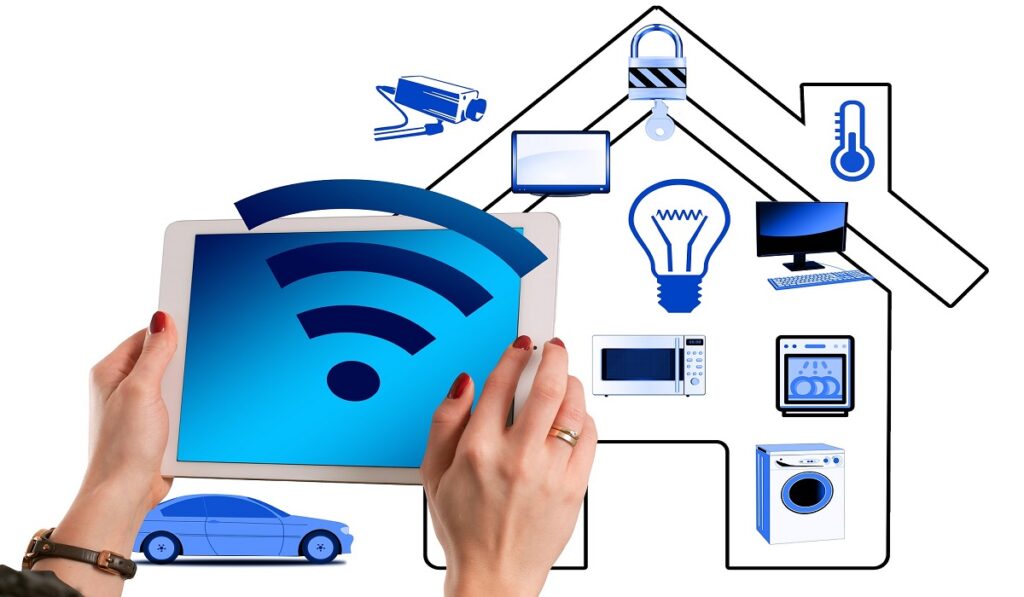The Internet of Things (IoT) is a network of physical devices embedded with sensors and software across a network to collect and share data. In this article, we will talk about the most important applications of the Internet of things and how they can improve our lives?

How Does the Internet of Things (IoT) Affect Our Everyday Lives?
With the advancement in communications, the Internet entered most of the things around us, so there is a way that allows understanding between interconnected devices through sensors, actuators, various artificial intelligence tools, and others.
With the spread of cellular or mobile phone technology as a new form of technology and the emergence of tablet and smartphone technology, the door was opened wide for the expansion of the phenomenon of electronic and audio-visual social communication.
All this led to the emergence of the third generation of the Internet, which is the generation concerned with the availability of Internet tools, such as search engines that are concerned with building links between concepts and the meaning of vocabulary, to transform unstructured or semi-structured data into structured data that is easy to use and manipulate.
Then there was a tremendous development in equipment technology with sensors, simple and effective software algorithms, devices that use the global positioning system (GPS), proximity and remote sensing technology, and wired and wireless connectivity. This led to a paradigm shift on the Internet from the Internet of Communications to the Internet of Things.
The phenomenon of communicating via the Internet appeared among the devices with each other, and this shift raised great enthusiasm among individuals and institutions to benefit from these services.
What is the Internet of Things (IoT)?
The term Internet of Things (IoT) is increasingly used to define devices that are specifically connected to the local network and the Internet with each other independently of human action.
The Internet of Things (IoT) is a network of physical things or people that we call “things”. These “things” are linked and embedded with other technologies that include: software, electronics, networks, and sensors. These technologies allow these objects or as we have said “things” to collect, share and interact with data.
The goal of the Internet of Things is to expand the Internet connection more than it used to be in standard devices such as computers, mobile phones and tablets, so that it extends to relatively dumb devices, if you will, interact with them and direct the necessary instructions to them, such as a coffee machine.
One of the most important reasons that led to the emergence of the Internet of things is the development of artificial intelligence (AI), which helped in the emergence of many important inventions.
IoT is wearable and portable, which creates a connected world by transforming surrounding physical objects into an information ecosystem that rapidly changes the way people live.
IoT inventions continue to make devices smarter, which in turn makes human life easier. Let’s take a look at the most important Internet of Things applications:
Real-World Applications of Internet of Things (IoT)
There are many real-world applications of the Internet of Things around us.
The new wave of connectivity is going beyond smartphones and laptops, it is moving towards connected cars, connected wearables, connected healthcare, smart homes, smart cities, smart retail, smart learning environments and basically a connected life.
The most important areas in which the Internet of Things (IoT) is used are the following:
Internet of Things in Health
There are many applications of the Internet of Things in the field of medicine that in turn help in performing a lot of complex tasks.
There is no doubt that the medical field has improved a lot due to modern technologies and the great digital transformation that has occurred recently.
Advanced portable medical devices and also many mobile medical services were invented, which led to the improvement of health care.
Through the Internet of things technology, patients can be monitored in their homes, medicines can be sent to them, and medicines are even dispensed to them from smart pharmacies before their quantity runs out.
Cancer, diabetes, and hypertension patients each have their own device that tracks vital and health indicators and sends reports to doctors about their condition, and the extent of predicting any risk in their health status.
A person can also save himself in the event of a heart attack by using the latest technologies of the Internet of Healthcare Things (IoHT)
.A study conducted by a group of doctors in 2019 shows the usefulness of these technologies, as doctors designed a device known as the Support Vector Machine to distinguish the sound of a dying inhale, by bringing his mouth closer to the phone, so the device reads his condition, and informs the emergency doctor to take the necessary measures.
It is likely that more reliance will be placed on the Internet of things technologies in the coming years. Thanks to artificial intelligence, the spread, and exchange of medical information have become very easy.
Internet of Things in Cars
The Internet of Things affects all aspects of human life, and cars are no exception.
Self-driving cars are just the clearest example of this effect, as they are controlled by smartly crafted technologies, Wi-Fi connectivity and smartphones.
In the past, smart cars were considered a fantasy, but thanks to the Internet of Things and artificial intelligence. These cars have become a reality and will be put on the market soon.
In fact, there is a kind of smart car that senses accidents and gives signals to avoid them. The car recognizes the edges, sidewalks, and road signs and makes decisions to drive or park without the driver’s intervention.
Also, a computer specializing in a car maintenance workshop can communicate remotely with a car, to detect a fault in it without the need for the car to visit the workshop.
With these driverless vehicles, the traffic accidents caused by drivers ’mistakes will be reduced. Which leads annually to the loss of many human lives.
Self-driving vehicles also help people with disabilities and the elderly drive cars with ease.
Now we just have to wait to see what the future holds for us in terms of driverless cars.
And the most prominent companies producing these cars are Tesla and Google.
Internet of Things in Education
Internet of things has greatly contributed to the availability of scientific knowledge, and obtaining it has become very easy.
Educational institutions have employed the Internet of things in education to improve the quality of education provided and to make educational or administrative tasks more effective.
The Internet of things has many scientific applications in education sector. These applications are like presentations that are made through poster boards through which students’ performance and interaction can be monitored and their mistakes can be corrected.
Newer terminology such as virtual classrooms, smart libraries, virtual universities, and e-books appeared, and high-quality technologies were used such as interactive whiteboards, 3D printers, smart lighting, automatic cooling and heating systems, ID cards that support RFID, biometric-based attendance tracking system, security cameras, etc.
In these systems, the student remains permanently connected to his curricula and professors, as letters are sent to him with his schedules and assignments, and suggestions to join personal and development courses and academic topics, such as various training opportunities.
Internet of Things in Agriculture
In agriculture, IoT-based smart farming systems can help, for example, in monitoring light, temperature, humidity and soil moisture in crop fields using connected sensors.
With the help of sensors and interconnection, IoT in agriculture not only saved farmers’ time but also reduced the excessive use of resources such as water and electricity.
IoT in Agriculture provides farmers with data for rational farm management plans to save time and money.
The Internet of Things also plays an essential role in the automation of irrigation systems, their working times, and the quantities of water required for each field. “Of course, not all agricultural products consume the same quantities of water”.
Smart Home
Through the Internet of Things technology, it is possible to operate the air-conditioning, lighting, preparing food, watering the gardens, inspecting the contents of the refrigerator and alerting the end of food in it, and even extending to requesting a list of food from the food centers.
The refrigerator can communicate with the shopping center, purchase and deliver supplies without human intervention, so understanding between things using the Internet Protocol is essential.
Smart Cities
In a smart city, the censors and the Internet of Things can be the most prominent era in all of their fields.
IoT technology can be utilized in the use of smart street lights and smart meters, helping to reduce traffic, conserve energy, monitor and address environmental concerns and environmental pollution, and improve sanitation. All of these applications will save resources and improve their utilization in optimal ways.
IoT technology enables the development of city services, such as electrical and water networks, as well as traffic regulation networks, so that they are able to report damage and accidents on the roads and take appropriate action.
Water sprinklers in public gardens can also irrigate, and even sense from the humidity and temperature sensor, so they spray water to soften the atmosphere.
The Importance of IoT in Today’s World
The Internet of things has many advantages in tody’s world, including:
Security systems: The security systems at the entrances to buildings, homes, and room doors are connected to the Internet, which make you easily control who you want to enter and who you do not want to enter.
Companies and schools: Companies do not abandon the Internet in everything they use, as it helps to develop the performance of employees greatly, and schools have also adopted the IoT and smart devices to provide annotated lessons to students without the need to carry more books.
Refrigerators: Connecting refrigerators to the Internet helped many women learn to cook! Because smart fridges can display easy cooking recipes, they also offer suggestions for new types of food.
The most important feature is that it monitors the amount of food stored in it and can issue shopping orders to buy missing food while you are away from it.
In addition, it monitors the viability of the foods inside it and reminds you of the benefits of the vegetables and fruits that are found in it.
Air conditioners: Smart air conditioners are distinguished by the fact that they can cool or heat the house if you send an order to do so before returning from outside.
Washing machines: The washing machines are easily connected to the Internet, which helps the housewife to go out at any time and leave the washing machine running, and through an application connected to the washing machine; she controls the size of the laundry and the type of program that fits the clothes.
The cars: IoT technology helps you enjoy driving cars as it has provided multiple pleasures, including electronic maps that show you the path you want and keep you away from crowded roads as well as the advantage of playing a musician through the Internet.
The Internet of Things gives cars a distinctive technology, which is the automatic cooling and heating features, with displaying the weather conditions for the places that the driver intends to go to.
Modern agricultural systems: The Internet of things has not abandoned the development of agricultural and farming systems, as it helps farmers to check the health of cows, cattle, and poultry, and it can easily identify any diseases they carry. It also helps farmers know what kind to plant at this time of the year.
IIoT is a collection of autonomous sensors, instruments, and devices connected via the Internet for industrial applications.
Read Here: Industrial Internet of Things and Digital Transformation




Pingback: Top 10 Technology Trends You Need to Know for 2022 – SciTech Society